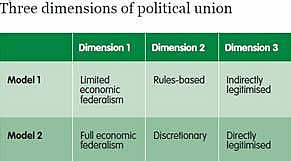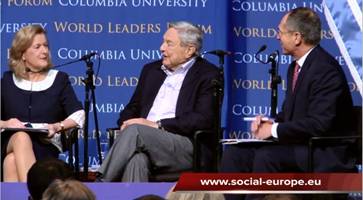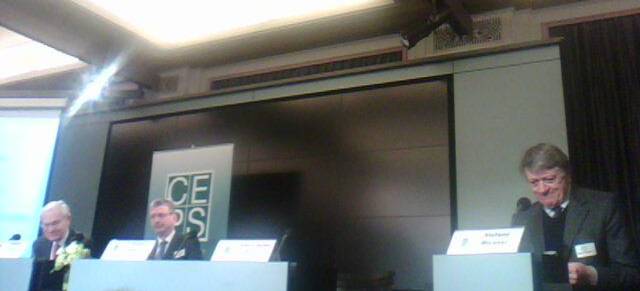| 'THE POLITICAL PROJECT' from Jacques Delor
Actual, but more than a decade ago, the content of the Wallenberg speech on Reuniting Europe: Our Historic Mission from Jacques Delor held 14 November 1999 at the Aspen Institute. Still touches the section 'The political project' out of this speech the heart of the matter:
It is not possible to discuss this subject without being clear and frank. In a European Union of
thirty Member States, we cannot retain the same objectives and aspirations set out by the
Maastricht Treaty since, once the number of partners around the table have increased, the
differences in perception between Member States make it very difficult to reach agreement on
common actions, in point of both the means and the bjectives. Look at the difficulties already
experienced by the European Union of fifteen in implementing all the provisions of the
Maastricht Treaty.
This is obvious in connection with the two areas in which new developments in the building of
a united Europe are expected - foreign policy and defence, or justice and police affairs. The
discussions under way in these two areas make this abundantly clear. The delay in developing
these policies is not attributable to the unsuitability of the institutions, as is sometimes claimed,
but to political - and sometimes philosophical - visions which translate differently even within
the Europe of fifteen Member States, that is, the idea which each of us has of the world role of
our own country, and also to diverging conceptions of the exercise of sovereignty.
In day-to-day relations between Member States, the most important thing is to give political
responses to certain basic questions. For example: who wants to take on the means to
implement what are known as the Petersberg missions, participation in peace-keeping
operations, repatriation of refugees, humanitarian aid and, if need be, intervention in a crisis so
as to restore a peace?
Or how to quantify the European military effort in relation to the Atlantic Alliance and do we
agree to share the burden if we really want a European pillar for the Atlantic Alliance? Does this
entail - and it should always be borne in mind – the possibility of the European Union
specifically carrying out Petersberg missions? Or again, in the field of justice, are we in basic
agreement on the policies to implement jointly so as, for example, to set up transnational teams
of police officers or to terminate certain money-laundering practices?
Rather than a predetermined definition of the institutional framework, it seems to me to be
important for those concerned to agree on a "Community method", that is to say, to make use of
what I call the "institutional triangle" - the Council, the Commission and the European
Parliament - under the direction, as it should be, of the European Council, that is to say, the
Summit of Heads of State and of Government, and subject to the supervision of the Court of
Justice. Experience has shown that when it diverges from that method, Europe gets nowhere.
It remains to be seen whether the method will remain effective when there are twenty-five or
thirty around the table. I have good reason to doubt it: at fifteen, taking the views around the
table in the Council of Ministers takes forever and the participants tend to get up and leave once
they have spoken in order to speak to the press without waiting for the end of the debate. You
can imagine what that will be like with thirty! ... In truth, the whole operation of the Council of
Ministers needs to be rethought if we want citizens to be able to follow the decision-making
process, which is lost on them in the labyrinth of a procedure which may take months, if not
years, with drafts circulating from committee to committee before they are examined by the
appropriate bodies of the Parliament and come back at last to the Council.
I do not believe either in the virtues of the so-called ratchet theory according to which political
progress emerges as if by magic from economic integration. I have therefore never believed that
the Economic and Monetary Union - for which I worked so hard - would, as some claimed,
serve as a springboard for political union.
No, we have reached the stage of development of European affairs where we cannot avoid a
direct political approach to the issues. This is why I keep asking the same question: "What is it
we want to do together? How far are we prepared to go to achieve together the things which
matter to us and which we cannot, or can no longer do individually?"
I asked that question in my capacity of President of the Commission before the last enlargement,
because I considered, not without reason, that it had to be answered before the three applicant
countries at that time, Austria, Sweden and Finland, acceded. Those three countries’ objectives
did not always coincide with those stated by the Twelve, particularly in view of their neutral
status. I fear that I was preaching to deaf ears. It was as if the question was taboo, because by
asking it one risked offending one party or another or harming a sort of blissful optimism which
had to be preserved.
For my part, I still think that it is better to ask the real questions rather than sweeping them
under the carpet and that there are fewer risks in revealing any potential disagreements before
welcoming new partners than after having recruited them. It should therefore not come as a
surprise that I have persisted, in public and in private, in asking men and women from the
countries of central and eastern Europe, both political leaders and representatives of civil society
and intellectuals, what objectives they hope to achieve by joining the Community.
Far be it from me - as you will appreciate - to attempt to dissuade them, as I told you in my
introductory remarks. I am convinced that it is our historic mission to reunite Europeans in a
single political entity, but I should like us to agree on the content of the marriage contract before
choosing its general form. That is to say, before we define the institutions which will enable us
to work together, since in order for those institutions to allow us to bring a joint project to
fruition, that project must have been defined with sufficient precision.
This is also true of the States already in the Union at least as much as it is for those knocking on
the door. Do we want to be faithful to the European contract which I would sum up as follows:
competition which stimulates, cooperation which strengthens and solidarity which unites? Do
we have the will to give the European Union the means this contract requires? If so, I say
without hesitation that the European budget will have to exceed the limits imposed by Agenda
2000 to which the German Presidency got the Fifteen to agree last spring. What I would like to
see is all the conclusions drawn from the principle affirmed in his time by Hans Genscher,
according to which no Member State can be made to go further than it can or wishes to do so,
but that a State not wanting to go further may not prevent the others from doing so. |


